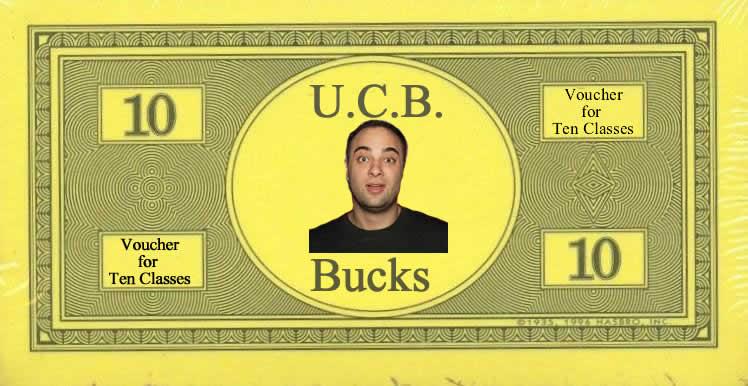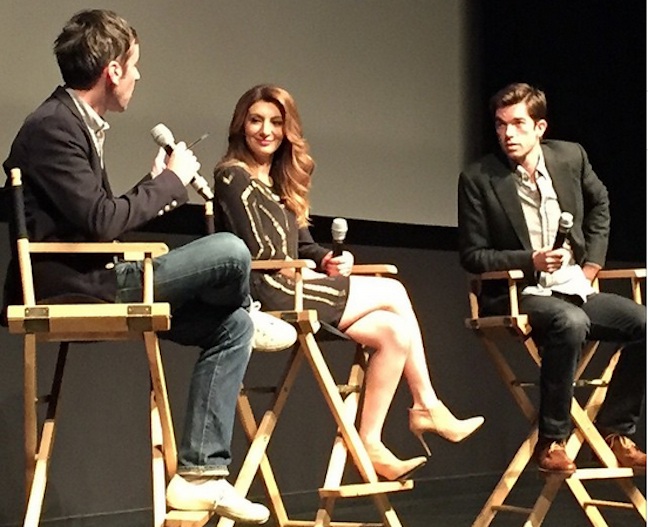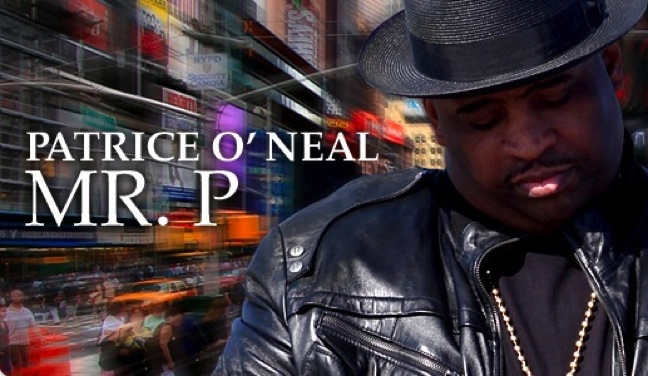When the Upright Citizens Brigade’s East Village theater celebrated its grand opening in November 2011, major print and broadcast media outlets showed up to interview the UCB’s Amy Poehler and Matt Walsh, and Fugazi’s Ian MacKaye showed up, too, to recognize the comedy collective’s tribute to his post-hardcore punk band’s philosophy of keeping ticket prices low for the fans.
Close followers knew that the opening of the UCBEast took years to realize, negotiating with East Village neighbors and community boards in addition to renovations of the space on Avenue A and East Third Street. Hundreds of thousands of dollars were sunk into UCBEast before it staged its first show.
Audience members didn’t see, or probably didn’t give much thought about how the phrase “time is money” has factored into the opening and operation of the venue, or not factoring into the payment of performers, as those two cases may be.
Until now.
A new generation of stand-up comedians has taken up the charge, so to speak, and united — if not quite unionized — on behalf of their right to earn a commission on ticket prices assessed to audiences who come to see them perform.
This kerfuffle, this hullabaloo, this rigamarole has played out before in both New York City and Los Angeles; from the picket lines outside The Comedy Store in the 1970s to more recent petition efforts that increased “spot pay” wages the Manhattan comedy clubs dole out each night to stand-ups. A show called The Debate on Sunday night at The Stand comedy club called attention specifically to the UCB theater in the East Village. But it was an online series of discussions, rants and monologues that really stoked the hot-button flames over the past week.
Kurt Metzger became a lightning rod for these discussions, what with his proclivity for ranting on Facebook about this, that and anything else on his mind that he didn’t get off of his chest while onstage.
Early Monday morning, Metzger joked on Facebook that his status updates about the UCB “that aren’t pure venom” weren’t being shared as much. “We’d all rather have this thing turn out positive for both comics and UCB instead of an endless grudge, right? I don’t want to be in charge of this, and I only care about myself. I can’t stress that enough. But they’re talking now so let’s see what happens. Maybe my shitty compulsive rants will lead to something good for once. Regardless of what they do, you as an individual comic can have some self-esteem and not deal with places that don’t treat you right. When you’re new, you do have to pay your dues and eat some shit here and there. What you don’t have to do is act like a scared illegal immigrant all the time. None of these places make or break you ultimately.”
These places. All of the Facebook and Tumblr posts in recent days revolved around the UCB’s three theaters in New York City and Los Angeles, but what about all of the other black-box theaters, bars, and independent rooms that book stand-up comedy. Or, for that matter, one-person comedy shows, sketch and improv groups?
The People’s Improv Theater (The PIT) in New York City, founded by a former original UCB performer (Ali Farahnakian), has cut door deals of varying degrees and with varying success with outside show producers. So do other bars, hoping live comedy shows will bring in new customers who will drink and eat at their establishments in addition to laughing at the comedians. Sometimes those producers don’t pass the bucks down to the performers; sometimes it’s payment in drink tickets; most times, audiences have little or no understanding of whether or how much the performers are paid. They only know if they have to pay to get in the door to enjoy the shows.
At the NerdMelt venue behind Meltdown Comics in Hollywood, Comedy Central is taping a pilot episode of “The Meltdown with Jonah and Kumail,” the weekly stand-up showcase that happens there each Wednesday night. Producer/booker Emily Gordon told The Comic’s Comic: “For our show, we give each comic a $40 gift certificate to Meltdown Comics, which is the comic book store that is our venue is housed in. They also get a free poster for that week’s show, which is an original piece of art made for that show specifically, with all the comics’ names on it, made by our in-house artist. And we always have booze on hand for performers.”
In the San Francisco Bay Area, Nato Green (now a writer for FX’s Totally Unbiased with W. Kamau Bell) told The Comic’s Comic: “I spent years being told that I was doing it for ‘exposure.’ There are a few shows, most notably the famous Throckmorton Theatre in Marin, that pay. That’s why I started producing my own shows in a music club with a door split and paying out the comics. Some shows pass a tip jar, and there have been a few that will pay a headliner. But there have been a lot of shows that run showcases, charge at the door, and don’t pay.”
Green would like to see comedians embrace their art form more as artists. “I’m convinced that part of it is that we don’t claim being artists enough,” he said. “We generally categorize ourselves fully in the field of commercial entertainment and babysitting drunks. But there is a lot of nonprofit arts funding that we don’t get. We work just as hard at our craft and often reach more people than independent theater folks, dancers, and visual artists, but we don’t even have the language to talk about comedy in ways that the arts world can understand. We can’t cede arts funding to other disciplines while our people starve.”
My own anecdotal evidence recalls plenty of places and times when payment meant something other than money. In the late 1990s, I performed with an improv group that held a weekly residency at the Comedy Underground in Seattle, where I didn’t see money. Hosting stand-up shows there oftentimes meant drinks and chicken fingers. As a reporter at the Boston Herald in the mid 2000s, I saw firsthand the nuturing down by Rick Jenkins at the Comedy Studio in Cambridge. Jenkins would buy you a drink, hand you a free DVD of your performance, and for promising new stand-ups, a month of booked showcase sets. In the short and long run, this probably meant more to these comedians than cold, hard cash. And I’ve never heard anyone complain about the Studio’s policies. When The Comic’s Comic hosted and produced a stand-up showcase last year at 92YTribeca, the venue charged admission and gave me drink tickets to distribute to the performers.
Five years ago, Will Franken caused a fuss when after a run of sold-out one-man shows at the UCB Chelsea theater, he passed the hat around to his audience looking to earn a few bucks for his efforts.
What does the UCB have to say for itself in 2013?
Matt Besser told me on Monday that he and Ian Roberts, two of the so-called “UCB Four” (Amy Poehler and Matt Walsh being the other two), likely would record a special episode of his Earwolf podcast, “improv4humans,” when the UCB assembles this coming weekend at SF Sketchfest. to “lay out our whole philosophy and our history” so there’s no confusion about the matter.
From their end, Besser explained that while the UCB is not a nonprofit organization, neither he nor the other three “UCB Four” members have profited personally from the theaters or the schools. “What business can you point to where the four CEOs have taken no money from their company?” Besser asked.
The theaters pay their managers and techs, but rely on interns for help while offering free rehearsal and performance spaces. When the UCB Four moved to NYC from Chicago, they rented spaces and lost money on half of them. When they opened their own theater, Besser said they thought they’d be able to use revenues to make a movie, but instead had to spend $50,000 when the air conditioning broke. Their current Chelsea theater was a source of regular ridicule, even by themselves, due to the condition of the seats, pipes and more until finally undergoing a renovation over the Christmas holiday. “Shows in the black pay for the shows that go in the red,” Besser said. Likewise: “Chelsea theater paid for the L.A. theater. L.A. theater paid for UCBcomedy.com. UCBocmedy.com doesn’t pay for anything. It’s a money pit. It’s purely creative and it costs a lot of money.”
The UCB historically hasn’t paid performers in cash; drink tickets, maybe. Paying improvisers, sketch groups, one-person shows and all of the stand-ups would not only be literally costly but also incur other tax issues for the theaters. “If you’re not around, you don’t get that,” Besser said. “I understand that. But most of the stand-ups on our stage aren’t as experienced as Kurt is. They’re not getting paid at the (Comedy) Cellar or Carolines.”
Tonight at UCBeast is a variety show and an interactive play. Both shows cost $5 each. The UCB Chelsea location has its Harold Night in-house improv teams performing at $5 shows. The Stand has a stand-up show tonight charging $15 per ticket. Tonight’s stand-up show at Carolines costs $22 per ticket, plus a two-drink minimum. Gotham Comedy Club has “New Talent” tonight for $12, also with a two-drink minimum. The Comedy Cellar charges $12 on Mondays-Tuesdays for its professional stand-up showcases, with a two-item minimum. Comic Strip Live is charging $16 per ticket tonight.
If UCB raised its prices, it would have money to pay performers. UCB chooses to keep prices low for audiences, and to provide a space where those audiences can see performers take risks. The UCB Chelsea location has a long-running popular stand-up show, Whiplash, at 11 p.m. Mondays that brings in the most famous comedians as well as those who may someday become that famous. It’s a free show.
Besser said perhaps booking stand-up at UCBeast at charged shows in weekend primetime slots is a mistake. Because the UCB isn’t trying to be a comedy club. And he hopes the stand-ups who perform there aren’t thinking of his theaters as clubs. Besser said at the L.A. location, he has noticed a different attitude from comedians who regularly dropped in at the old Tuesday night Comedy Bang Bang with CBB guests who hadn’t done the show before. “What I’d invite them to do is not do the same 15 minutes when they’re at our theater,” he said. “If they’re doing their club material, they’re wasting their time. That’s a waste of time at our theater.”
Will Hines, longtime UCB improviser and teacher who now also performs stand-up in both clubs and indie rooms, wrote on Tumblr that it’s “a valid request” for a performer to be paid. Whether that’s a viable business model in the East Village, however, is up for debate. Hines writes from his experience:
“The East Village is an interesting place. The model that all stand-ups remember is Rififi in the Invite Them Up/Oh, Hello days. Free for audiences, two drinks tickets for all performers, no one gets paid and there’s lots of shows with almost no oversight from management. It was a cool thing that let a lot of stand-ups intermingle and develop. One problem: Rififi went out of business. Then Mo Pitkins seemed to be a version of Rififi and IT went out of business. Then Sound Lounge in Williamsburg took a lot of those shows and then it got forced out of its liquor license because of a picky community board. The Creek and the Cave seems to be making that model work, but it’s a full service bar and restaurant with two stages. I wonder if it’s possible in the higher rent location of the East Village. Kabin’s show seems to be carrying that torch but it’s a bar first, not a theater. Maybe a bar is the only place it can work for east village comics?”
Chris Gethard, who improvises with Hines weekly in The Stepfathers, hosts a weekly cable access show, and also has an IFC development deal, wrote on Tumblr on Monday that he suggested upon the UCBeast’s opening that the theater needed to know the differences between the stand-up culture and the improv/sketch culture if they wanted to book more stand-up shows there.
He recently performed at a mainstream club where two young women came specifically to see him perform, waited until the end of the show and spent more than $40 in tickets and drinks to see his 10 minutes of stand-up. Had they done so at the UCB, it would have been $10 or less with no requirement to drink.
Gethard wrote: “I bet a lot of this controversy could be averted if there was something as simple as “Performers get three free drinks a night”, which at most bars totals about 20 dollars, no? And just give the person running the show enough tickets for all their performers and let the performers come and go as they please. My guess is that right there, 90% of this settles down pretty fast. Because that 20 dollars comes down to respect, and there are a lot of ways to show respect and I think people on both sides would agree with that.”
Caroline Creaghead, who books Creaghead and Company (formerly Pretty Good Friends) Sundays at Union Hall in Park Slope, noted that she pays her performers. That show charges a $7 cover. But for the Eugene Mirman Comedy Festival, they asked fans to kick in more via Kickstarter so they could pay to run the festival and pay to bring in performers. “Don’t like that UCB doesn’t pay? Don’t perform at UCB,” she wrote in response to Gethard. “Can’t get booked anywhere else? You best get back to work and stop expecting pay for practice.”
Michael Lawrence, responding to Gethard, wrote he hopes that the community unifies rather than splinters into one group vs. another. “As for the pay it’s about gratitude and respect,” Lawrence wrote. “No one is asking for pay comparable to venues that operate in the standard two drink minimum format. There should be no one way to do comedy or one standard format. I think what happened especially was that when comics saw the theater was charging double and we weren’t getting a cent of it, we felt a bit short-shrifted. What that pay means is an appreciation of our time. “Thanks for giving us your time when you could have anywhere else.” No one’s expecting to make a living off what they make at the UCB. We’re expecting enough to cover dinner or cab fare. We all hope to get to that point where we have a lot of money, but in the meantime (and meantimes can take a long time, even if you’re good), a token of compensation to make that night easier would be nice.”
When he showed up for “The Debate” show that wasn’t actually a debate at The Stand on Sunday night, Metzger let the audience know he had spoken to Besser, and that both men sincerely wanted to improve the situation for everyone, so “give him a chance” (there is video of Metzger at The Stand’s “Debate” show, but beware the blurring of opinions, facts and misinformation therein). Later, Metzger told The Comic’s Comic that he still believes fundamentally that stand-up performers should be paid whenever the audience is paying to see them. “Stand-up doesn’t follow improv rules,” Metzger said.
“I already made more than enough angry noise so now let’s see what happens.”
(Monopoly money graphic of Kurt Metzger UCB Bucks by Mark Anthony Ramirez)




UPDATE: Matt Besser and Ian Roberts recorded a special 56-minute podcast late Tuesday. In it, they discuss the brief history of the UCB moving to NYC from Chicago in 1996, renting spaces to put on shows, then running their own spaces, and the philosophy behind their comedy and their business.
In short, their show business is not the same as your idea of Show Business. In full, well, listen. Then weigh in with your comments!
https://www.earwolf.com/episode/bonus-episode-ask-the-ucb-the-ucb-philosophy/
I’d like to see an audit of how a comedy school/theatre that has expanded and charges a lot of money for classes that sell out and pays no money for shows that sell out isn’t making a profit. This is the same nonsense argument the Comedy Store made in 1979. Artists have to eat. People who book and produce a sold out 120 seat theatre not including the increased bar sales should at the very least get paid for their efforts.
Not to mention many of the comedians who perform on those shows do get paid work at clubs in the city. THe only shows they don’t get paid for are the ones that don’t charge money. WHy should UCB get off scott free for charging costumers when not paying comedians when other venues that charge also pay.